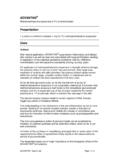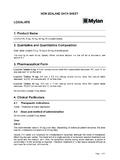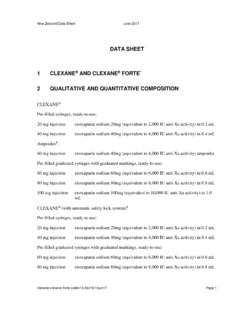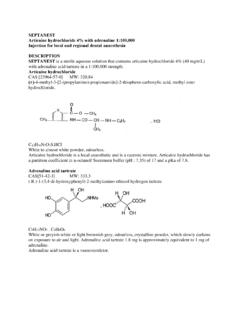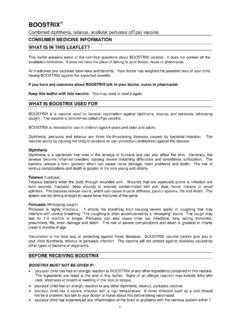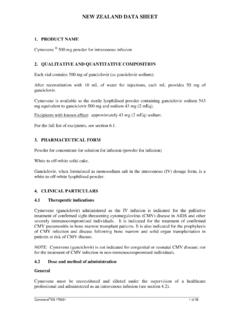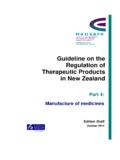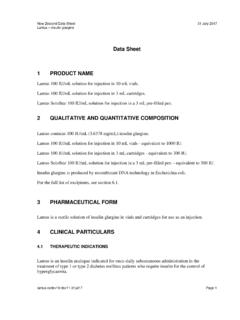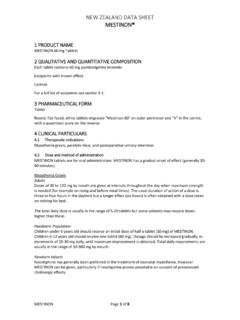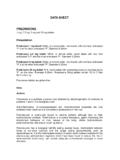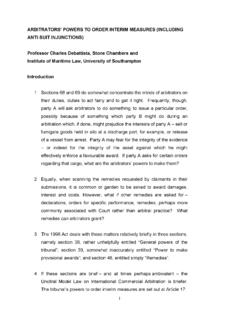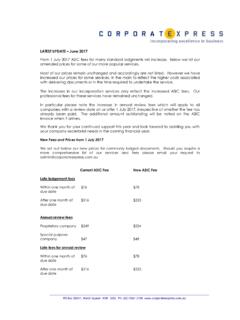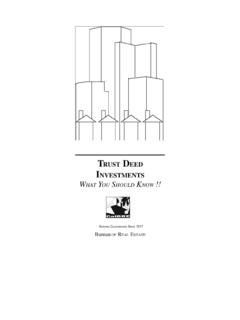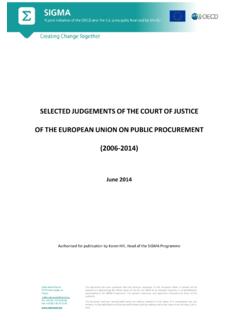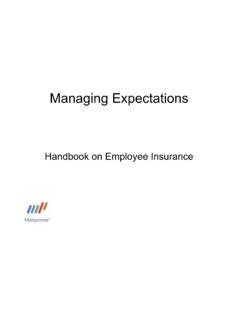Transcription of Guideline on the - Medsafe
1 Guideline on the Regulation of Therapeutic Products in New Zealand Part 2: Obtaining approval for new and changed medicines and related products Edition March 2016 Contents Section 1: Introduction .. 5 The New Zealand Medicines Act 1981 .. 5 Other information relevant to this Guideline .. 5 Overview of the approval of new and changed medicines .. 5 Section 2: Who can submit an application .. 7 Sponsor obligations .. 8 Section 3: New medicine application types .. 10 When is a medicine a new medicine ? .. 10 Evidence that a medicine has been generally available .. 10 Previously approved medicine that has not been generally available .. 10 Combination packs of currently approved medicines .. 11 New Medicine Applications .. 11 Application selection tools.
2 11 New Higher-risk Medicine Applications .. 11 New Active Substance .. 12 New Intermediate-risk Medicine Applications .. 12 New prescription medicines based on a parent product .. 13 New Lower-risk Medicine Applications .. 14 Abbreviated New Medicine Applications .. 14 Abbreviated evaluation process .. 14 Eligibility criteria .. 15 Recognised regulatory authorities .. 16 Applications for provisional consent .. 16 Renewal of provisional consent .. 16 Conversion from provisional consent to full consent .. 17 Priority assessment of New Medicine Applications .. 17 Criteria for priority assessment .. 17 Application fees .. 18 Further categorisation of New Lower-Risk Medicine Applications .. 19 N1 applications clones .. 19 N1 applications flavour/fragrance/colour variants.
3 20 N1 applications new pack size/classification .. 21 N1 applications new combination 21 N2 applications OTC monograph .. 21 N3 N5 applications .. 21 N3 products .. 22 N4 products .. 22 N5 Generic extension / new chemical entities .. 23 Section 4: Changed medicine notifications .. 24 Risk-based notification categories .. 24 Self-assessable changes .. 24 Making multiple changes for the same therapeutic products .. 25 Making the same changes for multiple therapeutic products .. 25 Combination packs and mixed sponsorship .. 25 Abbreviated and priority assessment of notifications .. 25 Referrals under Section 24(5) of the Medicines Act 1981 .. 26 Changing the registration situation .. 26 Non-notifiable changes .. 27 Changes in pharmacopoeial specifications.
4 27 Changes in names of manufacturers or packers .. 28 Updates to Drug Master Files .. 28 Updates to Plasma Master Files .. 28 Changes to Working Cell Banks or Working Seeds .. 28 Addition or change to New Zealand Site of Product Release .. 29 Change of sponsor .. 29 Fees for changed medicine notifications .. 29 Effecting a change in the market place .. 30 Section 5: Guide to preparing new medicine applications .. 31 Formats for New Medicine Applications .. 31 New Zealand Module 1 requirements .. 31 General data requirements .. 32 Formatting of documents .. 33 Older dossier formats .. 33 General requirements for applications based on a parent product .. 34 Format for RFI responses .. 34 Section 6: Proprietary Ingredients .. 35 Registration of a Proprietary Ingredient with the database.
5 35 Proprietary Ingredient form .. 35 Registration search .. 36 Section 7: Guide to preparing a changed medicine notification .. 37 Formats for changed medicine notifications .. 37 Section 8: New and changed related products .. 38 New related products data requirements .. 38 Changed related product notifications .. 38 Fees for related products .. 39 Section 9: Submitting an application or notification .. 40 How to submit an application or notification .. 40 Electronic submissions .. 41 Higher-Risk application requirements .. 41 Lower-Risk application requirements .. 41 All other applications .. 41 Submission process .. 41 Formatting of electronic submissions .. 42 Source of electronic document .. 43 Pre-submission meetings.
6 43 Section 10: Administrative processes for new and changed medicines or related product applications .. 45 Monitoring the application process .. 45 Application screening .. 45 Unaccepted applications .. 45 Payment of 46 46 Requests for further information (RFI) .. 46 Decision and finalisation .. 47 Withdrawal .. 48 Processing of priority assessment applications .. 48 Section 11: Timelines .. 49 Target timelines .. 49 Clock stops .. 49 Appendix 1: Glossary of terms .. 50 Appendix 2: Application categorisation tool .. 51 Appendix 3: OTC placement tool .. 51 Appendix 4: Decision tree for umbrella branded OTC medicines .. 55 Appendix 5: Additional notes on categorisation of applications for new OTC medicines .. 56 OTC medicines to be assessed via the N4 route.
7 58 Appendix 6: Summary of data requirements for new medicine applications .. 59 Module 1 .. 59 Module 2 .. 60 Module 3 .. 60 Module 4 .. 61 Module 5 .. 61 Appendix 7: OTC dossier documents matrix .. 62 Appendix 8: Data requirements for new medicine applications .. 65 Part 2, Ed Page 5 of 65 Section 1: Introduction The New Zealand Medicines Act 1981 The following sections of the Medicines Act 1981 (the Act) are most relevant to the approval of new and changed medicines and related products. Medicines Act 1981: Section 3: Meaning of medicine, new medicine, prescription medicine and restricted medicine Section 20: Restrictions on sale or supply of new medicines Section 21: Applications for Minister s consent Section 22: Procedure in respect of applications for Minister s consent Section 23: Minister may give provisional consent Section 24: Distribution of changed medicines restricted Part 7.
8 Related products Other information relevant to this Guideline Application forms including guides to completing an application Fees payable for applications Regulatory timelines Application search Application status Medsafe s position statement on biosimilars Guideline for the Regulation of Therapeutic Products in New Zealand Parts 1, 4, 5, 6, and 10 Overview of the approval of new and changed medicines Medsafe interprets New Zealand s medicine legislation to mean that in most circumstances medicine distributors need to obtain Ministerial consent before commencing distribution. Applications for consent are submitted to Medsafe along with evidence to demonstrate that the medicine meets the claimed safety, efficacy and quality standards. Medsafe s role is to assess the evidence provided against the standards expected of medicines.
9 Medsafe provides advice to the Minister s delegate regarding the safety, efficacy and quality of the medicine and whether it has an acceptable risk : benefit profile. The standard expected of medicines is briefly outlined in the Medicines Act and associated regulations. However the legislation does not specify what factors constitute an acceptable risk : benefit profile. Therefore Medsafe refers to international guidance to ensure medicines supplied meet the expectations of the New Zealand public. In general Medsafe expects that medicines supplied in New Zealand meet all applicable national and international standards unless adequately justified by the product owner. Justifications are assessed and accepted on the basis that the overall risk profile of the medicine is not compromised by use of an alternative standard.
10 Part 2, Ed Page 6 of 65 The risk profile of a medicine is proportional to the amount of data required to be assessed to ensure that the risks inherent in any medicine have been adequately mitigated. To facilitate processing of applications with varying risk profiles, Medsafe uses application categorisation tools to stream application types. Fees are payable for applications as outlined in regulation 61 of the Medicines Regulations 1984. Medsafe uses standard fee waivers to develop a schedule of fees for the application types. Part 2, Ed Page 7 of 65 Section 2: Who can submit an application The Medicines Act 1981 requires that a New Medicine Application (NMA), New Related Product Application (NRPA), Changed Medicine Application (CMN) or Changed Related Product Notification (CRPN) is lodged by or in the name of a manufacturer, importer or proprietor resident in New Zealand.
